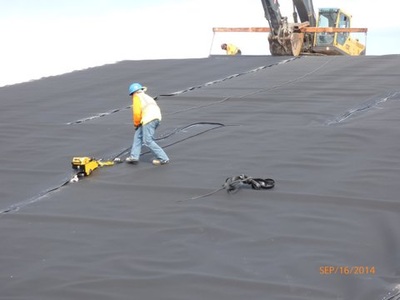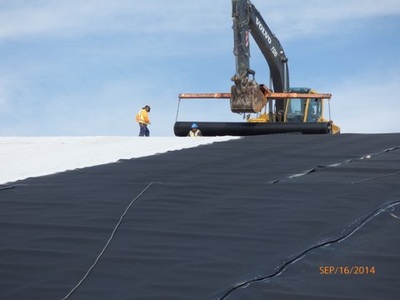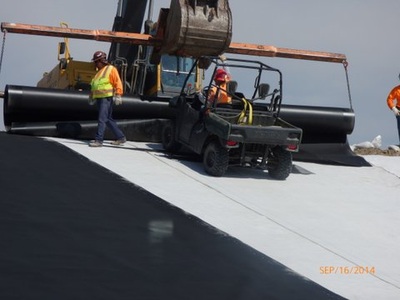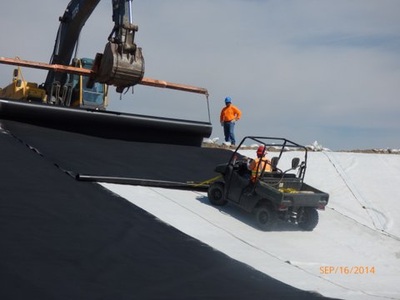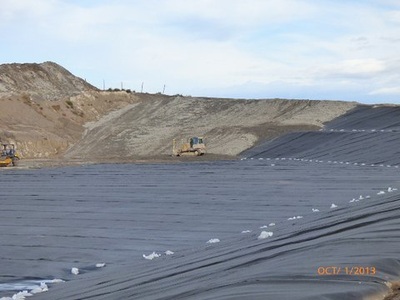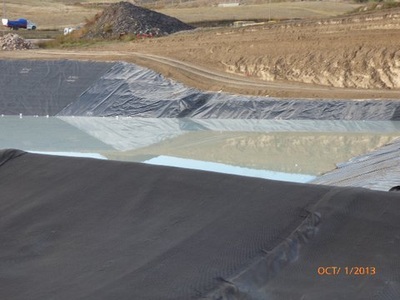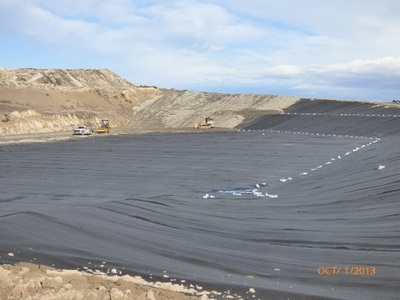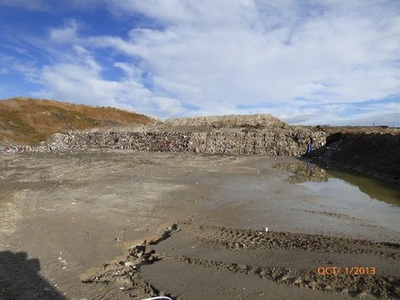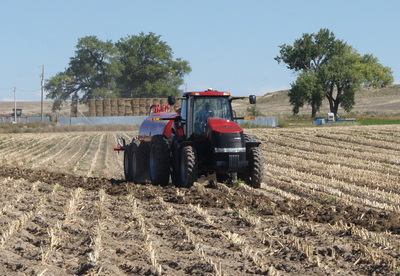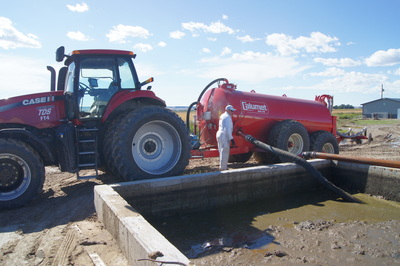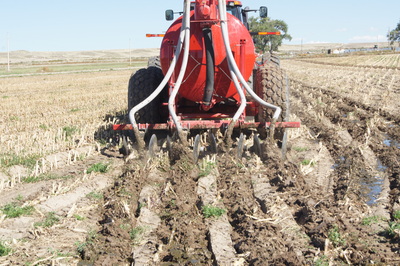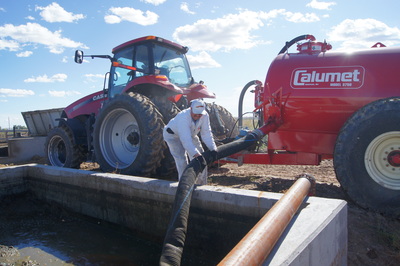TDS News
December 1, 2014
TDS Private Landfill Readies for the Future
After 14 months of construction, TDS Environmental Services recently finished the newest update to its landfill, which is located a few miles west of Torrington, Wyoming. TDS operates the only privately owned landfill in the state of Wyoming.
According to TDS owner and President Gary Olson, the new construction will provide over 40 years of future garbage disposal in an environmentally safe and responsible manner.
“The project constructed another cell, which will contain the refuse we collect,” Olson explained. “The cell has three parts, A,B and C, each 13 acres in size and each will provide 15 to 18 years of collection space. Since we separate and bale all of our collections, we use about 70 percent less space than a landfill that doesn't bale.”
To construct the new cell, 1.3 million yards of dirt was removed from a 39 acre area and the three parts defined and separated from each other. Next, a liner was installed to direct any rain water and runoff into a three and a half acre collection pond, where the water can either evaporate or be pumped.
“We only put a liner in section A at this time, since it will be the only one we use for the next several years,” Olson said. “The pond is also lined but will service all three parts of the cell.
Bentonite goes down first, then a rubberized seal liner goes down and the seams are heat welded together. Next a rubber mat covers the 1st liner, then a protection liner goes on top of that and finally it is all covered with two feet of dirt. It took 20 workers eight days to get the liner installed.
“The construction has to meet DEQ (Wyoming Department of Environmental Quality) and EPA (U.S. Environmental Protection Agency) requirements and as a private landfilll we live by the rules established by the DEQ and EPA."
Currently, TDS collects trash from the majority of rural homeowners in Goshen, Niobrara, Platte, Laramie counties and the panhandle of Nebraska. The new project ensures the company has the capacity to safely dispose of a sizable amount of garbage for decades into the future.
According to TDS owner and President Gary Olson, the new construction will provide over 40 years of future garbage disposal in an environmentally safe and responsible manner.
“The project constructed another cell, which will contain the refuse we collect,” Olson explained. “The cell has three parts, A,B and C, each 13 acres in size and each will provide 15 to 18 years of collection space. Since we separate and bale all of our collections, we use about 70 percent less space than a landfill that doesn't bale.”
To construct the new cell, 1.3 million yards of dirt was removed from a 39 acre area and the three parts defined and separated from each other. Next, a liner was installed to direct any rain water and runoff into a three and a half acre collection pond, where the water can either evaporate or be pumped.
“We only put a liner in section A at this time, since it will be the only one we use for the next several years,” Olson said. “The pond is also lined but will service all three parts of the cell.
Bentonite goes down first, then a rubberized seal liner goes down and the seams are heat welded together. Next a rubber mat covers the 1st liner, then a protection liner goes on top of that and finally it is all covered with two feet of dirt. It took 20 workers eight days to get the liner installed.
“The construction has to meet DEQ (Wyoming Department of Environmental Quality) and EPA (U.S. Environmental Protection Agency) requirements and as a private landfilll we live by the rules established by the DEQ and EPA."
Currently, TDS collects trash from the majority of rural homeowners in Goshen, Niobrara, Platte, Laramie counties and the panhandle of Nebraska. The new project ensures the company has the capacity to safely dispose of a sizable amount of garbage for decades into the future.
November 15, 2014
TDS Begins Bio-Remediation Operations
Following through with its commitment to find and implement improved methods of waste management, TDS Environmental Services has acquired the equipment necessary for the bio-solid remediation (BSR) of septage collected through its septic pumping services.
TDS President Gary Olson said getting into BSR was a natural extension of TDS's current services that include the operation of a private landfill and septage collection throughout southeast Wyoming and the Nebraska Panhandle.
“Using collected sewage is an economical alternative method of fertilizing for farmers and ranchers,” Olson said. “It is a safe, proven method of disposal. It has been used for centuries around the world.”
The company has also partnered with the University of Wyoming and it's Sustainable Agriculture Research and Extension Center (SAREC) just west of Lingle to collect data on the effect TDS's bio-solid remediation project has on crops.
“We've applied the product to test plots on wheat strips and summer fallow at SAREC,” Olson said. “It is at least a two year project to be able to tell how effective the remediated product might be, but the initial feedback is very good.”
Officials at SAREC, says that the applications have gone well, but the study will be ongoing for awhile before the total effect of human fertilizer on non-irrigated crops can be determined.
“We really won't know until early next year how the affect the septage will have on the crops,” Baumgartner said. “We've taken the first base line soil samples at the sites and they look good, but we won't take another one for awhile.
Olson is excited about the prospects TDS's bio-solid remediation project will have on southeast Wyoming and the Nebraska Panhandle, especially in terms of turning what has been considered waste into an effective fertilizer alternative for area growers.
“But with our use of technology and the ability to inject the product directly into the ground we believe we can help meet the needs of our area farmers and ranchers, despite the growing cost of traditional fertilizer.”
TDS has worked closely with the Environmental Protection Agency and the Wyoming Department of Environmental Quality, both of which closely monitor and regulate bio-remediation, to ensure safe and responsible applications on non-irrigated crops.
TDS President Gary Olson said getting into BSR was a natural extension of TDS's current services that include the operation of a private landfill and septage collection throughout southeast Wyoming and the Nebraska Panhandle.
“Using collected sewage is an economical alternative method of fertilizing for farmers and ranchers,” Olson said. “It is a safe, proven method of disposal. It has been used for centuries around the world.”
The company has also partnered with the University of Wyoming and it's Sustainable Agriculture Research and Extension Center (SAREC) just west of Lingle to collect data on the effect TDS's bio-solid remediation project has on crops.
“We've applied the product to test plots on wheat strips and summer fallow at SAREC,” Olson said. “It is at least a two year project to be able to tell how effective the remediated product might be, but the initial feedback is very good.”
Officials at SAREC, says that the applications have gone well, but the study will be ongoing for awhile before the total effect of human fertilizer on non-irrigated crops can be determined.
“We really won't know until early next year how the affect the septage will have on the crops,” Baumgartner said. “We've taken the first base line soil samples at the sites and they look good, but we won't take another one for awhile.
Olson is excited about the prospects TDS's bio-solid remediation project will have on southeast Wyoming and the Nebraska Panhandle, especially in terms of turning what has been considered waste into an effective fertilizer alternative for area growers.
“But with our use of technology and the ability to inject the product directly into the ground we believe we can help meet the needs of our area farmers and ranchers, despite the growing cost of traditional fertilizer.”
TDS has worked closely with the Environmental Protection Agency and the Wyoming Department of Environmental Quality, both of which closely monitor and regulate bio-remediation, to ensure safe and responsible applications on non-irrigated crops.

